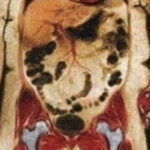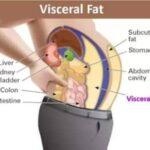Menopause is a natural biological process that marks the end of a woman’s menstrual cycle. While it’s a normal phase of life, it often comes with a range of changes in the body, including shifts in metabolism and fat distribution. One of the most common concerns for women during and after menopause is the accumulation of belly fat. This stubborn fat affects one’s appearance and poses significant health risks. Understanding why belly fat accumulates post-menopause and learning how to tackle it head-on is crucial for women’s overall well-being.
The Science Behind Belly Fat Accumulation Post-Menopause
During menopause, a woman’s body undergoes hormonal changes, notably decreased estrogen levels. Estrogen plays a significant role in regulating metabolism and fat distribution. As estrogen levels decline, women tend to experience an increase in visceral fat, which is the type of fat that accumulates around the abdominal organs. This leads to the characteristic “apple-shaped” body rather than the “pear-shaped” body commonly observed in pre-menopausal women.
Visceral fat is more metabolically active and poses more significant health risks than subcutaneous fat, the fat found just beneath the skin. It’s associated with insulin resistance, inflammation, cardiovascular disease, and other metabolic disorders. This is why post-menopausal women often face an increased risk of developing conditions such as type 2 diabetes, heart disease, and stroke.
The Dangers of Belly Fat
The accumulation of belly fat isn’t just a cosmetic concern; it’s a severe health issue. Research has shown that excess visceral fat is strongly linked to a higher risk of various health problems, including:
- Type 2 Diabetes: Visceral fat interferes with insulin’s ability to regulate blood sugar levels, leading to insulin resistance and an increased risk of developing type 2 diabetes.
- Heart Disease: Belly fat contributes to elevated levels of LDL cholesterol (the “bad” cholesterol) and triglycerides while reducing levels of HDL cholesterol (the “good” cholesterol), thereby increasing the risk of heart disease and stroke.
- High Blood Pressure: Visceral fat produces substances that promote inflammation and impair blood vessel function, contributing to hypertension (high blood pressure).
- Metabolic Syndrome: The clustering of abdominal obesity, high blood pressure, high blood sugar, and abnormal cholesterol levels increases the risk of metabolic syndrome, a condition that significantly raises the risk of heart disease, stroke, and diabetes.
Tackling Belly Fat: Solutions and Strategies
While genetics and hormonal changes play significant roles in the accumulation of belly fat post-menopause, there are lifestyle changes and strategies that women can adopt to mitigate its effects and promote overall health. Mayo Clinic experts offer valuable insights and recommendations for managing belly fat effectively:
- Healthy Eating Habits: Focus on a balanced diet rich in fruits, vegetables, whole grains, lean proteins, and healthy fats. Limit the intake of refined carbohydrates, sugary foods, and beverages, as they contribute to belly fat accumulation and metabolic dysfunction.
- Regular Exercise: Engage in regular physical activity, including aerobic exercises, strength training, and flexibility exercises. Aim for at least 150 minutes of moderate-intensity aerobic activity or 75 minutes of vigorous-intensity activity per week, combined with muscle-strengthening activities on two or more days per week.
- Stress Management: Chronic stress can contribute to abdominal fat accumulation through hormonal pathways. Practice stress-reducing techniques such as mindfulness meditation, yoga, deep breathing exercises, or hobbies that promote relaxation and well-being.
- Adequate Sleep: Prioritize quality sleep, aiming for 7-9 hours per night. Poor sleep quality and insufficient sleep duration have been linked to weight gain and increased visceral fat deposition.
- Avoiding Smoking and Excessive Alcohol Consumption: Both smoking and excessive alcohol intake have been associated with abdominal obesity and various health complications. Quitting smoking and moderating alcohol consumption can have significant benefits for overall health and weight management.
- Medical Evaluation and Treatment: Consult healthcare professionals for personalized guidance and medical interventions if necessary. In some cases, medications or hormone therapy may be recommended to address specific health concerns associated with menopause and belly fat accumulation.
Conclusion
Belly fat accumulation post-menopause is a common and concerning issue for many women, but it’s not an inevitable consequence of aging. By understanding the underlying factors contributing to this phenomenon and implementing lifestyle modifications such as healthy eating, regular exercise, stress management, and adequate sleep, women can effectively manage belly fat and reduce their risk of associated health complications. Mayo Clinic experts emphasize the importance of adopting a holistic approach to wellness, encompassing both physical and emotional well-being, to achieve optimal health outcomes during and after menopause. With the proper knowledge and strategies, women can navigate this transitional phase of life with confidence and vitality.





